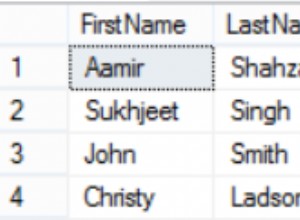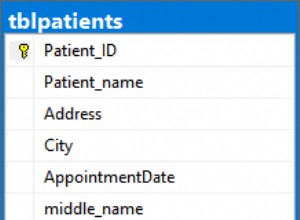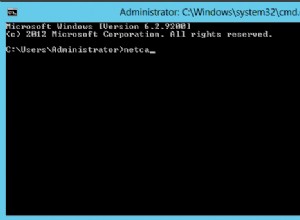Questa query conteggerà tutte le righe e conterà anche solo le righe in cui Attribute non è nullo, raggruppando per anno e mese in righe:
SELECT
Year(`date`),
Month(`date`),
Count(*) As Total_Rows,
Count(`Attribute`) As Rows_With_Attribute
FROM your_table
GROUP BY Year(`date`), Month(`date`)
(questo perché Count(*) conta tutte le righe, Count(Attibute) conta tutte le righe in cui Attribute non è nullo)
Se hai bisogno della tua tabella in PIVOT, puoi usarlo per contare solo le righe in cui Attribute non è nullo:
SELECT
Year(`date`),
Count(case when month(`date`)=1 then `Attribute` end) As Jan,
Count(case when month(`date`)=2 then `Attribute` end) As Feb,
Count(case when month(`date`)=3 then `Attribute` end) As Mar,
...
FROM your_table
GROUP BY Year(`date`)
E questo per contare tutte le righe:
SELECT
Year(`date`),
Count(case when month(`date`)=1 then id end) As Jan,
Count(case when month(`date`)=2 then id end) As Feb,
Count(case when month(`date`)=3 then id end) As Mar,
...
FROM your_table
GROUP BY Year(`date`)
(oppure, invece di contare l'id, puoi usare Sum(Month( data)=1) come nella risposta di Kander). Ovviamente puoi combinare entrambe le query in questo:
SELECT
Year(`date`),
Count(case when month(`date`)=1 then id end) As Jan_Tot,
Count(case when month(`date`)=1 then `Attribute` end) As Jan_Attr,
Count(case when month(`date`)=2 then id end) As Feb_Tot,
Count(case when month(`date`)=2 then `Attribute` end) As Feb_Attr,
Count(case when month(`date`)=3 then id end) As Mar_Tot,
Count(case when month(`date`)=3 then `Attribute` end) As Mar_Attr,
...
FROM your_table
GROUP BY Year(`date`)




